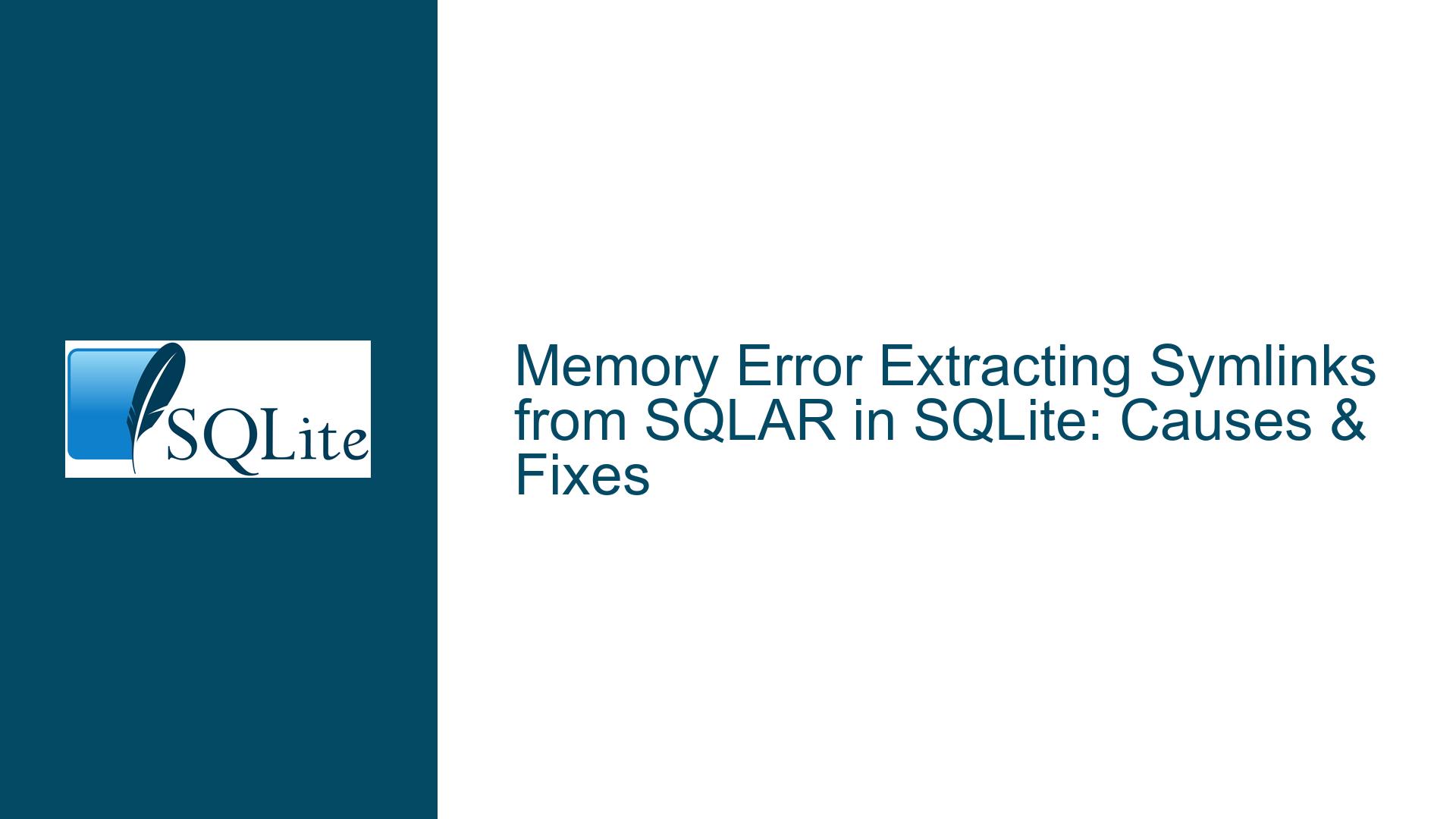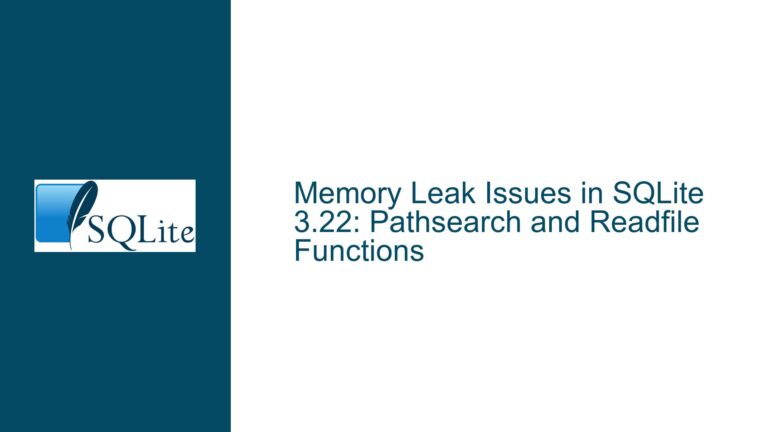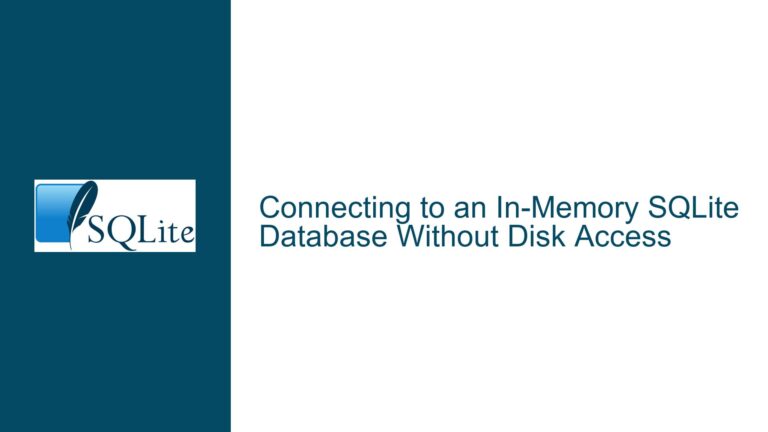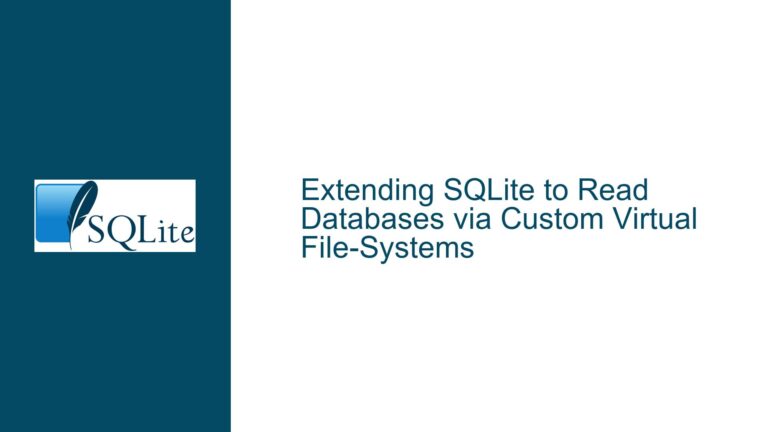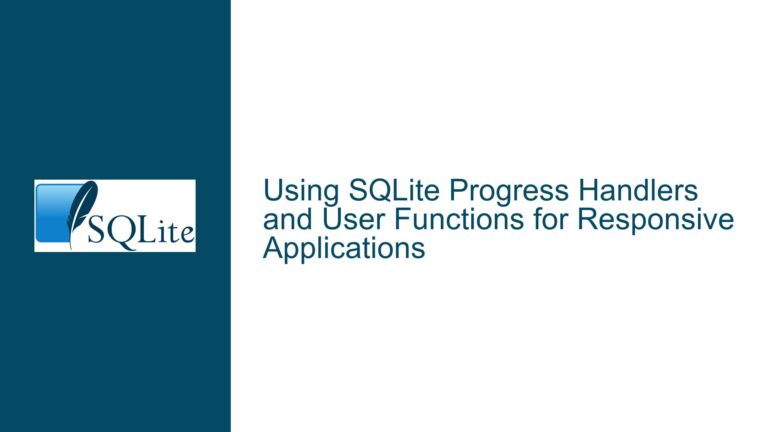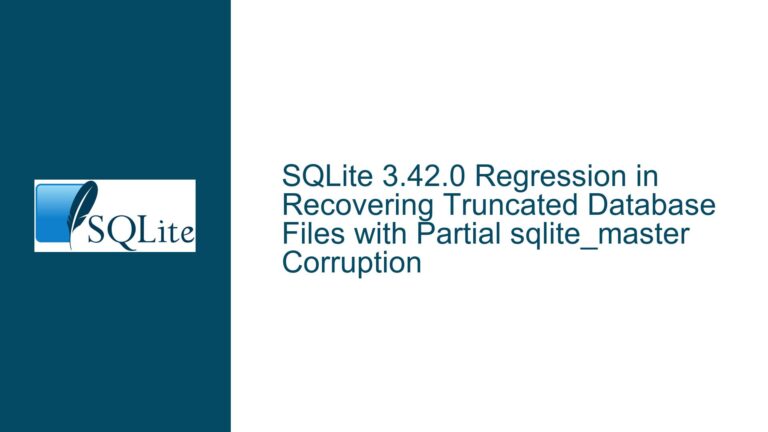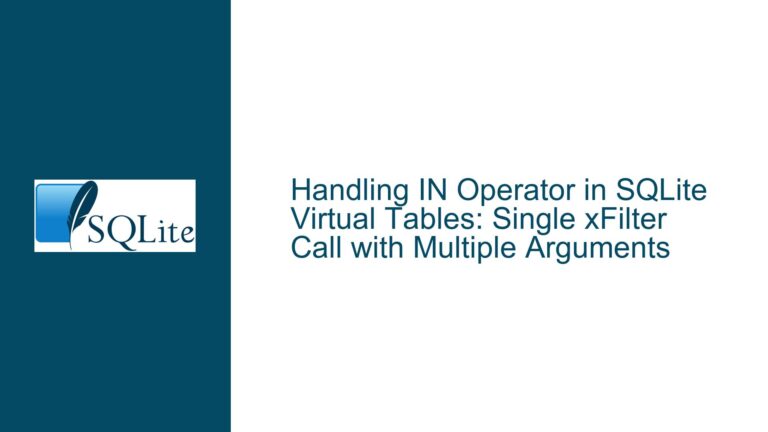Memory Error Extracting Symlinks from SQLAR in SQLite: Causes & Fixes
Issue Overview: "Out of Memory" During SQLAR Symlink Extraction
The core issue involves an unexpected "out of memory" error when attempting to extract symbolic links (symlinks) from a SQLite Archive (SQLAR). The error occurs despite correct adherence to SQLAR specifications for symlink storage: the sz column is set to -1, and the symlink target path is stored as a TEXT value in the data column. This error is reproducible across multiple operating systems, including Linux (Pop!_OS 22.04) and Windows (via Cygwin), using SQLite versions prior to 3.46.0.
The problem arises during the extraction phase of the SQLAR workflow. While regular files and directories extract without issues, symlinks trigger a memory allocation failure. The error message is misleading because the system has sufficient memory; the root cause lies in how SQLite processes the sz value for symlinks.
Key observations from the error context:
- Database Schema Integrity: The
sqlartable structure aligns with documented requirements for symlink storage. - Cross-Platform Reproducibility: The error manifests on both Unix-like systems and Windows (via Cygwin), suggesting a systemic flaw in SQLite’s SQLAR implementation.
- Version Dependency: The issue is resolved in SQLite 3.46.0 and later, indicating a code-level fix was required.
Possible Causes: SQLAR Symlink Handling Flaws
1. Incorrect Memory Allocation During Symlink Extraction
SQLAR uses the sz column to determine the size of the data to extract. For symlinks, sz is set to -1 to signal that the data column contains a text path rather than compressed binary data. A bug in older SQLite versions caused the extraction logic to misinterpret sz = -1 as an unsigned integer, leading to an attempt to allocate an impractically large memory block (4,294,967,295 bytes on 32-bit systems). This over-allocation triggers the "out of memory" error, even though the actual data size is trivial.
2. Filesystem Metadata Operations on Symlinks
After fixing the memory allocation issue, a secondary problem emerged: SQLite attempted to set file modification times (utimes) on symlinks. Many operating systems, including Linux, do not support modifying timestamps on symlinks. This caused a "failed to create symlink" error during extraction. While not directly related to the original memory error, this flaw highlights inconsistencies in SQLAR’s platform-specific handling of symlinks.
3. Version-Specific Bugs in SQLite’s SQLAR Implementation
The SQLAR feature is part of SQLite’s sqlar extension, which has undergone iterative improvements. Prior to version 3.46.0, the extension lacked proper handling of edge cases involving symlinks, such as:
- Validation of
szvalues during extraction. - Conditional logic to skip unsupported operations (e.g.,
utimes) on symlinks. - Platform-specific adjustments for symlink creation APIs (e.g.,
symlink()vs. Windows junctions).
Troubleshooting Steps, Solutions & Fixes
Step 1: Verify SQLite Version and Apply Updates
Action: Check the installed SQLite version using sqlite3 --version. If the version is earlier than 3.46.0, upgrade to 3.46.0 or later.
Rationale: Commit 4d90c3f179a3d735 (included in 3.46.0) fixes the memory allocation bug by properly handling sz = -1 for symlinks. Subsequent commits (e.g., 2bf8c3f99ad8b74f) address the utimes issue.
Implementation:
- Linux/Pop!_OS: Download precompiled binaries from SQLite downloads or build from source.
- Windows/Cygwin: Use Cygwin’s package manager to update SQLite or manually replace the binary.
Step 2: Validate SQLAR Schema and Symlink Entries
Action: Confirm that symlinks are stored correctly in the sqlar table:
SELECT name, sz, data FROM sqlar WHERE sz = -1;
Expected Output:
name: Symlink filename (e.g.,link).sz:-1.data: Target path (e.g.,./link-target).
Common Pitfalls:
- Incorrect
szValue: Ifszis not-1, the entry will be treated as a regular file, leading to extraction errors. - Data Column Mismatch: Non-text data in
datafor symlinks causes corruption.
Fix: Re-archive the symlink using sqlite3 -A --create with the patched SQLite version.
Step 3: Platform-Specific Handling of Symlinks
Issue: Even after upgrading, extraction may fail if the target path does not exist or the OS restricts symlink operations.
Solutions:
Ensure Target Path Validity:
SQLite does not verify the existence of symlink targets during extraction. If the target is missing, manually create the required directory structure before extraction.Disable Timestamp Updates for Symlinks:
In custom SQLAR extraction scripts, modify the logic to skiputimes()for entries withsz = -1. Example in C:if( sz != -1 ){ utimes(zFile, times); }Windows-Specific Workarounds:
Windows (non-Cygwin) does not support POSIX symlinks. Use SQLite’s sqlar_win32.c extension to emulate symlink behavior via junctions or hard links.
Step 4: Rebuilding SQLAR with Compression Bypass
Scenario: If memory constraints persist during extraction, bypass compression for symlinks.
Procedure:
Insert Symlinks with
sz = -1anddataas uncompressed text:INSERT INTO sqlar(name, mode, mtime, sz, data) VALUES('link', 41471, 1714991860, -1, './link-target');Extract with
--no-compression:sqlite3 -A --file test.sqlar --extract --no-compression link
Note: This step is redundant in SQLite ≥3.46.0, as compression is automatically skipped for sz = -1.
Step 5: Debugging with SQLite Test Harness
Advanced: For developers, integrate SQLAR extraction tests into SQLite’s test suite.
Example Test Case:
test_sqlar symlink-extract {
# Create symlink
file link -symbolic link-target link
# Archive
sqlite3 -A --file test.sqlar --create link
# Extract
sqlite3 -A --file test.sqlar --extract link
} {}
Execution:
Run tests using make test in the SQLite source tree to verify symlink handling.
Final Validation
After applying fixes:
Extract Symlink:
sqlite3 -A --file test.sqlar --extract linkSuccessful extraction creates a symlink
linkpointing to./link-target.Verify Symlink Metadata:
ls -l linkOutput should show
link -> ./link-target.Check System Logs:
Usedmesgorjournalctlto confirm absence of memory-related kernel errors.
Conclusion
The "out of memory" error during SQLAR symlink extraction stems from historical flaws in SQLite’s handling of symbolic links, exacerbated by platform-specific filesystem operations. Upgrading to SQLite 3.46.0 or later resolves the core memory allocation bug, while cautious scripting avoids residual issues with symlink metadata. Developers integrating SQLAR should rigorously validate archive entries and tailor extraction logic to accommodate OS constraints.
